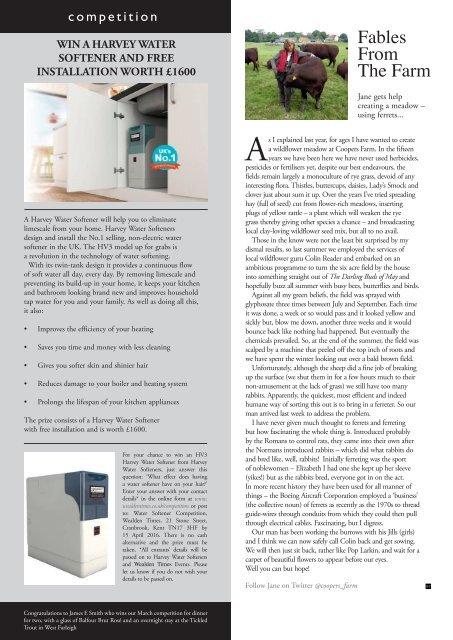Wealden Times | WT170 | April 2016 | Garden supplement inside
Wealden Times - The lifestyle magazine for the Weald
Wealden Times - The lifestyle magazine for the Weald
Create successful ePaper yourself
Turn your PDF publications into a flip-book with our unique Google optimized e-Paper software.
competition<br />
win a HARVEY WATER<br />
SOFTENER AND FREE<br />
INSTALLATION WORTH £1600<br />
Fables<br />
From<br />
The Farm<br />
Jane gets help<br />
creating a meadow –<br />
using ferrets...<br />
A Harvey Water Softener will help you to eliminate<br />
limescale from your home. Harvey Water Softeners<br />
design and install the No.1 selling, non-electric water<br />
softener in the UK. The HV3 model up for grabs is<br />
a revolution in the technology of water softening.<br />
With its twin-tank design it provides a continuous flow<br />
of soft water all day, every day. By removing limescale and<br />
preventing its build-up in your home, it keeps your kitchen<br />
and bathroom looking brand new and improves household<br />
tap water for you and your family. As well as doing all this,<br />
it also:<br />
• Improves the efficiency of your heating<br />
• Saves you time and money with less cleaning<br />
• Gives you softer skin and shinier hair<br />
• Reduces damage to your boiler and heating system<br />
• Prolongs the lifespan of your kitchen appliances<br />
The prize consists of a Harvey Water Softener<br />
with free installation and is worth £1600.<br />
For your chance to win an HV3<br />
Harvey Water Softener from Harvey<br />
Water Softeners, just answer this<br />
question: ‘What effect does having<br />
a water softener have on your hair?’<br />
Enter your answer with your contact<br />
details* in the online form at www.<br />
wealdentimes.co.uk/competition or post<br />
to: Water Softener Competition,<br />
<strong>Wealden</strong> <strong>Times</strong>, 21 Stone Street,<br />
Cranbrook, Kent TN17 3HF by<br />
15 <strong>April</strong> <strong>2016</strong>. There is no cash<br />
alternative and the prize must be<br />
taken. *All entrants’ details will be<br />
passed on to Harvey Water Softeners<br />
and <strong>Wealden</strong> <strong>Times</strong> Events. Please<br />
let us know if you do not wish your<br />
details to be passed on.<br />
A<br />
s I explained last year, for ages I have wanted to create<br />
a wildflower meadow at Coopers Farm. In the fifteen<br />
years we have been here we have never used herbicides,<br />
pesticides or fertilisers yet, despite our best endeavours, the<br />
fields remain largely a monoculture of rye grass, devoid of any<br />
interesting flora. Thistles, buttercups, daisies, Lady’s Smock and<br />
clover just about sum it up. Over the years I’ve tried spreading<br />
hay (full of seed) cut from flower-rich meadows, inserting<br />
plugs of yellow rattle – a plant which will weaken the rye<br />
grass thereby giving other species a chance – and broadcasting<br />
local clay-loving wildflower seed mix, but all to no avail.<br />
Those in the know were not the least bit surprised by my<br />
dismal results, so last summer we employed the services of<br />
local wildflower guru Colin Reader and embarked on an<br />
ambitious programme to turn the six acre field by the house<br />
into something straight out of The Darling Buds of May and<br />
hopefully buzz all summer with busy bees, butterflies and birds.<br />
Against all my green beliefs, the field was sprayed with<br />
glyphosate three times between July and September. Each time<br />
it was done, a week or so would pass and it looked yellow and<br />
sickly but, blow me down, another three weeks and it would<br />
bounce back like nothing had happened. But eventually the<br />
chemicals prevailed. So, at the end of the summer, the field was<br />
scalped by a machine that peeled off the top inch of roots and<br />
we have spent the winter looking out over a bald brown field.<br />
Unfortunately, although the sheep did a fine job of breaking<br />
up the surface (we shut them in for a few hours much to their<br />
non-amusement at the lack of grass) we still have too many<br />
rabbits. Apparently, the quickest, most efficient and indeed<br />
humane way of sorting this out is to bring in a ferreter. So our<br />
man arrived last week to address the problem.<br />
I have never given much thought to ferrets and ferreting<br />
but how fascinating the whole thing is. Introduced probably<br />
by the Romans to control rats, they came into their own after<br />
the Normans introduced rabbits – which did what rabbits do<br />
and bred like, well, rabbits! Initially ferreting was the sport<br />
of noblewomen – Elizabeth I had one she kept up her sleeve<br />
(yikes!) but as the rabbits bred, everyone got in on the act.<br />
In more recent history they have been used for all manner of<br />
things – the Boeing Aircraft Corporation employed a ‘business’<br />
(the collective noun) of ferrets as recently as the 1970s to thread<br />
guide-wires through conduits from which they could then pull<br />
through electrical cables. Fascinating, but I digress.<br />
Our man has been working the burrows with his Jills (girls)<br />
and I think we can now safely call Colin back and get sowing.<br />
We will then just sit back, rather like Pop Larkin, and wait for a<br />
carpet of beautiful flowers to appear before our eyes.<br />
Well you can but hope!<br />
Follow Jane on Twitter @coopers_farm<br />
Congratulations to James E Smith who wins our March competition for dinner<br />
for two, with a glass of Balfour Brut Rosé and an overnight stay at the Tickled<br />
Trout in West Farleigh<br />
07<strong>WT170</strong>WhatsOn.indd 166 23/03/<strong>2016</strong> 11:36


















